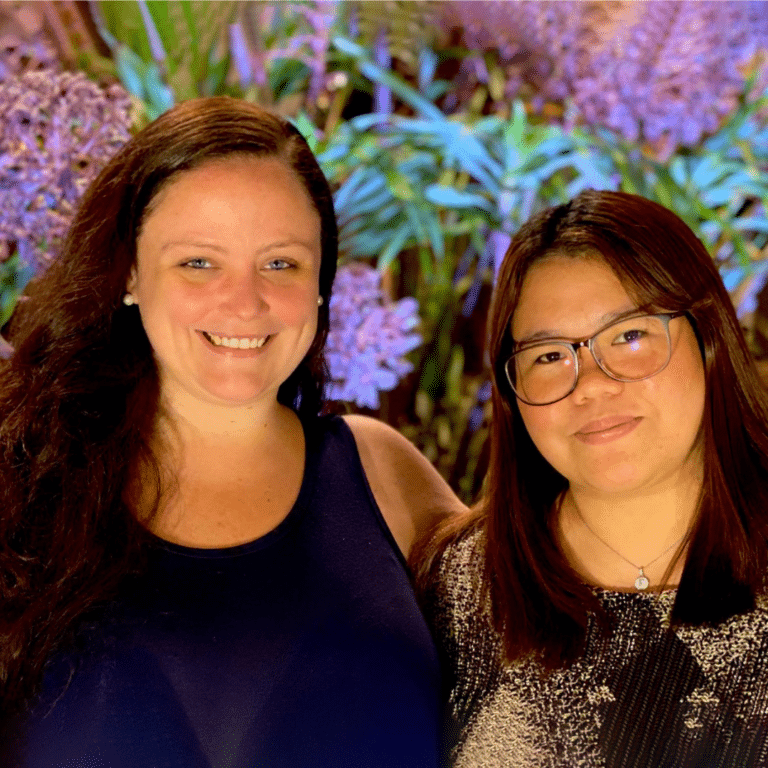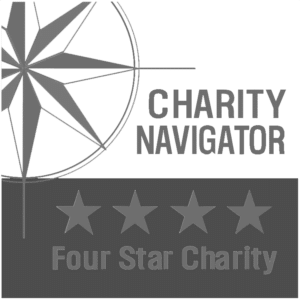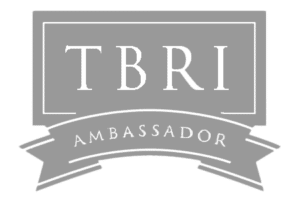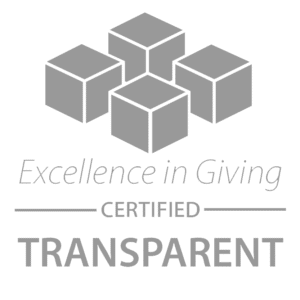You are listening to Together by AGCI. I’m Melissa Rush. I am so excited to be chatting today with Sarah, our Philippines Program Officer, and Taylor our Asia & Europe Programs Director. Taylor and Sarah are hard at work building AGCI’s programs in the Philippines that will impact children and families for generations to come. I am so inspired by their heart and dedication for this life-changing work, and I know you will be too. Let’s get into our conversation.
I am so excited to be chatting with Sarah, our Philippines Program Officer, and Taylor, our Asia & Europe Programs Director. Thank you guys so much for joining us today. Thanks for having us, Melissa. Of course. Taylor, I would love if you could start by just giving us kind of an overview of AGCI’s current work in the Philippines and our history in the area. Sure. So AGCI began our adoption work in the Philippines in 2012. And you know, since then forged a really good relationship with the central authority there who oversees adoption. And then in 2021, it was during Covid time and we partnered with the Karen Purvis Institute of Child Development because there was this hunger for understanding more about trauma and how to break the cycle of trauma through TBRI, Trust-Based Relational Intervention. But because of Covid, we couldn’t travel anywhere and specifically to Asia, so many of the borders were closed.
So we invited 10 countries throughout Asia, Philippines being one of them. There were 150 participants and we did a 10 week, what we called learning collaborative. So it was really an introduction to trust-based relational intervention and for a DCI’s part how we’ve implemented it around the world. And at the end of those 10 weeks, it really became clear to us that in the Philippines there were local leaders who had the readiness and the willingness to implement this thing called TBRI. Now they saw the need in the communities around them and they were like, we need to do this. Tell us how. So that’s really how we became involved When we knew through that we wanted to hire someone in country who could help us as a G C, I better understand the needs. So that’s where Sarah comes in. We hired her in July of 2022, it feels like longer, but she had a background in residential care and also she was, had been working with essential authority for a few years as well. And Sarah has just provided us with so much knowledge, I feel like I say to her, I wanna learn more about this. And she sets up the exact perfect meetings. Wow. That make it clear to me all of the questions I have. So we are just so fortunate to have her. Yeah.
And now we’re, we’re partnering with local leaders doing a bunch of different events and programs, which we’ll talk about a little later. Awesome. That’s amazing. And so this all started as like a virtual? Yeah. Wow. That’s it had to Yeah. Cause we started in 2021. Yeah. So yeah, we weren’t able to go over there physically to the Philippines until May of 2022. Wow. So wow. That was one, I think positive thing of Covid is I feel like we learned what we can accomplish like through Zoom meetings. Yeah. And that, you know, I mean obviously it’s great to be in person, but we work with people all over the world and so It is Yeah. With, you know, crazy time differences. And so it is pretty cool what we can do virtually. Totally. And it was so cool to see people, and again, especially in my experience being, we’ll say with the Philippines, like just wanting to continue the work in whatever way they can. Yeah. Virtually, you know, through Covid was so impressive to see. Yeah, that’s amazing. So how do we find and like develop these partnerships in the Philippines? Like what does that look like?
Yeah, I will say, you know, my experience with going to the Philippines and with interacting with local leaders in the Philippines is there’s just this generosity and warmth about them Every time I’ve, from the second I’ve stepped off the plane in Manila to go anywhere, but there’s also this like tenacity of let’s get it done. Which is a great combination. Yeah. So when we finished our 10 week learning collaborative in 2021, we were approached by an amazing group of women who were local leaders from several different organizations in the Philippines. And they said, you know, we wanna implement this TBRI thing with foster families. We have a group of foster families in this area called Menden now, which is one of, has one of the highest levels of poverty in the Philippines, and also one of the highest levels of online sexual abuse and exploitation of children. So they said, the children that are gonna be coming into the care of these foster parents have really intense trauma in their backgrounds. We wanna equip them with the resources to be able to parent them successfully. So how do we go about doing this? So we ended up doing about two months worth of mentorship. We’re fortunate enough to have people on our AGCI team who have so many ex, so much experience with TBRI that they’re actually mentors themselves.
So they worked with these five women who eventually went on to facilitate their own training in TBRI. Wow. In the Minton Now region for 10 families, 20 parents, which was really extraordinary to see. So for us at AGCI , it’s really about, okay, who has the willingness to go deeper and who is on board with our mission in really providing the love and care that we know every child deserves. Yeah. Well that’s so cool. And it’s kind of extraordinary to hear too, that they like heard about, you know, this incredible tool TBRI that we talk about all the time and then we’re like, okay, this is how this needs to be applied in our specific context. Yes. Like, this is how this can be useful. And that kind of brings me to our next question of like, how do we know where we’re needed and what capacity we might be able to help? Because in that instance, obviously they told you, right? Yes. Yeah. Yeah. One of the things I love about AGCI, you know, is that we, we have a model that we know works, but we will never go into any region, any area and say, this is what you need to do. Yeah. And this is how you should do it.
You know, the way we work globally is we start by working with local leaders who have their hands dirty in the work every single day, who can tell us the truth about what the needs really are in the Philippines. We’ve been doing that for over a year. Our first trip there was in May of 2022. Since then we’ve hired Sarah. But we’ve been literally just learning for over a year and listening to all of these different organizations who again, really understand the culture and the needs and what’s going on with children and families there in a way that we could never do from the us. So Sarah has provided us with, again, the statistics around how many children are in the system, how many children are in foster care, all of those things that are really important for us to know. Yeah. And then she’s also set us up with meetings with people from organizations like the International Justice Mission World, hope International, all of these people who are, again, knee deep in the work, who can really explain to us what that looks like on the day to day. Yeah, that’s awesome. And I do think that is such a thing that sets AGCI apart is that we like really take the time to listen and learn from the people that are actually in that work. And like yeah.
You know, li Sarah lives in the Philippines, like this is the world that she’s in every day. And we don’t ever assume that we have all the answers. We kind of go to people and are like, okay, like we have these tools, how can we help? And then they tell us how we can help, which is how it should be. But I think a lot of organizations kind of, you know, have a, a different mindset maybe, where they kind of are like, okay, like we know this, we’re just gonna come in, we’re gonna apply this as it is. You know? And maybe that works sometimes, but I think we have a really, maybe it also doesn’t Yeah, pretty much doesn’t ultimately. Yeah. And I just, I don’t know, that’s like my favorite thing about AGCI think is just like, yeah, that we do really listen to people and we’re, we’re there to learn. We recognize we’re not the experts and we just wanna help however we can in, in the way that makes sense for what the needs are of the area that we’re serving in. So that’s really cool. Yeah. And I will also say in the Philippines, one of the greatest things is that there’s just this spirit of collaboration versus competition.
Like even with organizations who are kind of doing, you know, working towards the same goal as AGCI, we’ve never felt like there’s any kind of competition. It’s always about how can we collaborate next? How can we put the different resources that we have together and really make a difference for children and families, which is just amazing. Yeah. Yeah. Well, Sarah, I’d love to hear from you, like, you know, as we kind of went into this, obviously AGCI just really believes in building strong partnerships with our in-country partners so we can kind of see what those needs are and how we can best support that as an in-country partner. Like what does that experience look like? Well, agency, I, you know, values collaboration. So our in-country partners are, I mean, the best people to identify the needs of their country as well as the programs and services to address this needs. So AGCI, it’s brings its expertise and experiences to align those with the needs of the country. So we work collaborative collaboratively with our partners so that SER services are holistically provided to our intended clients or recipients. So here in the Philippines, we started a learning collaborative with Filipino TBRI practitioners. The, so this learning series is for social workers and other childcare professionals.
So the Learning collaborative is a 10 week long learning series that started from August to, I think November, 2022. Yeah. So the learning session provided participants with insights and practical application of TBRI. So since we are focused on how we can implement TBRI, we also visited several shelters during Taylor’s visit here in the Philippines. So the pur, the purpose of this visit is to have a better understanding of the context of shelter and how T B R I can be applied in their programs. Oh, that’s really great to hear. Thank you for sharing what that is. Like on the other side, tey, I would love for you to share some of the impacts that like you have seen through our work in the Philippines. Yeah. Well, so the first thing I’ll say about the Philippines is that our programs are currently being designed and it’s a really slow and steady progression, which on some days is great. And some days it’s like, let’s just get it going. But the keyword is intentionality. Yeah. And again, just really listening to what those needs really are, which is so important, rather than just going in and starting a program and hoping it works. Yeah. We really wanna be intentional about it. So whereas in Columbia and Ethiopia, our programs are much more developed and we have so many children enrolled in them, which is great to see in the Philippines.
It looks a little different. Our impact right now has been largely partnering with those organizations who are implementing TBRI and walking with them as they, you know, increase their confidence in teaching and training themselves, which is great. And it’s also, right now we’re partnering with the central authority called nac, the National Authority for Childcare to have a national training in the Philippines in July, which will invite 350 participants, some from NAC and some from other participant participating NGOs. So, you know, I guess the answer is right now we’re still trying to figure out what our impact will be. Yeah. And continuing to listen to the needs. Yeah. Well that, I mean, like you said, like some days you, you know, are like, okay, come on, let’s, let’s get it going. But it, it really is like, I think what sets AGCI apart is the intentionality and that we’re not just throwing things at the wall and hoping they stick. You know, it’s like Yeah. Research based and really listening to what the needs are. And then also something that’s really cool. AGCI is the only like international partner of the Karen Purvis Institute. Right. So we are the only organization that has the authority to like, to go into different countries around the world and help implement TBRI, is that, am I understanding that correctly? Yeah, yeah, that’s correct. And it’s all set.
And I will say even as far as TBRI goes, you know, Sarah is becoming a practitioner herself now. Oh, amazing. Yeah. It’s actually two weeks from now she’s gonna be Wow. Congratulations. That’s very cool. Cool. Yeah. But she is going through the online portion of it and she has the opportunity to walk through that with one of our mentors who we have on staff at AGCI. And I mean, Sarah has been very vocal about certain things, certain strategies in TBRI that just like won’t work in the Philippines, you know? Yeah. And Sarah, I’m thinking even like eye contact, how TBRI encourages eye contact as a point of connection and Sarah, Sarah has said, yeah. But in the Philippines, that’s a form of discipline. Like that’s how you would Correct. Rather than connect. Yeah. So we might have to look at that a little differently. So even down to like the simple strategies that we would normally teach in the US or around TBRI, they look a little different there for sure. Yeah. And that’s like just an amazing example of why it’s so important to have incredible people like Sarah working with us that can tell us those things. Because what a crucial mistake.
Like, you know, if you’re, if that’s not culturally the way that that’s done, and then to just take our like Western lens and be like, oh, no eye contact. And Sarah’s like, no, that’s not right. That’s so valuable and like important to have that. So, wow. That’s really, really cool. Just because I think people connect with individual stories. Taylor is there, can you share a story of a child that just kind of demonstrates the need in the Philippines right now? Yeah. Well, one of the things I’ll say about the Philippines, and this is becoming sort of common knowledge everywhere around the world, is that it’s the epicenter of online sexual abuse and exploitation of children. Yeah. So when we were there, especially this, the last trip I took, when was I there, Sarah? It was like March yesterday. March, March. I was there in March. Yeah. It was recent. But yeah, we met with, we actually visited a children’s home that’s called an assessment center. So it’s for, you know, children who unfortunately are victims of online sexual abuse and exploitation. They’re brought there to do all of their assessments at once. So they have to see a doctor, they have to see a lawyer, they have to see a social worker. And this home provides a space where the children aren’t re-traumatized with every visit they have to go to Yeah. Meeting a new stranger.
They’re there with a trusted caregiver who can walk with them through that whole kind of intake process. So they were telling us a bit about why this exists in the Philippines specifically. Right. And one of the reasons is, first of all, that it’s an English speaking country, you know, so it makes people there vulnerable to people from the US or Europe online. That’s where the demand is. And unfortunately they make these connections online and it leads to that. Yeah. It’s very hard to track in the Philippines because you can’t just track one IP address there. Oh. Like you can here. Yeah. So it’s almost impossible to find kind of the perpetrator, you know? And so we learned all of this. And then also, you know, we learned, we, we, Sarah and I were asking like, but how does this work in families? And we learned that actually 90% of the cases happen within the homes. Oh. It’s not happening at a neighbor’s house. It’s not happening somewhere else in the community. It’s not happening at school. It’s happening within the home. And so, you know, unfortunately, we learned a, in a lot of cases, you know, let’s say a mother who has four children, she forms this relationship online with someone in the US or Europe. And it starts out as a very innocent conversation, a very innocent relationship that’s just like, Hey, how are you doing? Yeah. Hoping to connect. Yeah.
And then eventually it turns into, can you just share a picture of your child with me? Yeah. You know, I’ll give you the equivalent of like five US dollars for that. And then it eventually gets to, you know, can I see a photo with, with clothes off? And then in many cases, the mom is blackmailed and you know, they’ll say, well, if you don’t share this with me, then I’m, I’m gonna share the pictures I have from before with everybody. And it just becomes the cycle that’s really heartbreaking to see. So in one of the cases, you know, there was a girl, and I’ll change her name just for the sake of the story, but we’ll call her Isabel. Okay. She was, you know, her parents were separated and she had to move in with her maternal grandparents. She became really attached to her grandmother. And unfortunately, when she was around 10 years old, her grandmother died and she was left in the care of her grandfather who had to go to work every day. He still had to provide for her. So she was left home alone. And, you know, she formed connections with people in the community that would invite her over, they would allow her to like swim in her pool. They would f swim in their pool, they would feed her. And just welcomed her really as part of their family.
And then after she was groomed there, they started, you know, exploiting her online. And she didn’t have anyone to turn to because she didn’t have that attachment with her grandfather. She didn’t have an attachment with anybody in the community. And at that point, she felt so ashamed of herself Yeah. That she didn’t wanna tell anyone. So it was the secret that she carried and she just, you know, kept doing it because she didn’t see a way out. Yeah. And so we, I, you know, when I went home with that story, it just became really evident to us when we were designing future programming. And when we think about how we wanna be involved as AGCI moving forward, we wanna be involved in the family and figure out like what’s going on in the family and how can we provide services here. So that, number one, we keep families together as much as possible. Yeah. But number two, children always have a resource or someone to go to, someone to tell. Yeah. And know that they don’t have to be ashamed. Yeah. Oh, thank you for sharing that story. That’s so heartbreaking. And unfortunately, I think so common with, you know, victims of sexual abuse and exploitation that they feel, you know, ashamed. Like it’s somehow their fault. It’s never, never their fault. It’s never their fault. Right.
But yeah, I think just talking about it and, and making, you know, kids and, and adults feel comfortable sharing their stories and what they’re going through and having someone that they can turn to to help them. Yeah. Yeah. So, wow, that’s a powerful, powerful story. I know that things are in flux right now and still being developed, but what can you just share, you know, what kind of policy change we have been able to implement so far that we’re working on right now? Yeah. Sarah, do you wanna share a bit about the event and how we’re partnering with that? Oh yeah. We are currently in partnership with the NACC or the National Authority for Childcare. So the NACC is a, a government agency that has powers and functions relating to alternative childcare. So our current partnership with NACC is the implementation of the TBRI National Conference, which we aim to have like around 350 social workers from government and non-government agencies nationwide. So, wow, that’s amazing. Yeah. Can you share a little bit more about what’s next for AGCI in the Philippines? Well, following the national conference, we hope to have a, like a better picture of the childcare situation in the Philippines. So we want to identify existing programs, good practices, challenges, and I think more importantly is the, the gaps.
So we also wanted to learn more about the child protection laws, particularly the recent law on online sexual abuse and exploitation for children and or the OSA Act, that’s what we call here in the Philippines. So we are exploring potential collaboration with other organization working on the space. So you mentioned a new law. What is the new law? It is all about protecting the children against online sexual abuse and exploitation. And also, I mean this child sexual abuse and exploitation materials. So yeah. Yeah. So this new law also involves implementation rules. So there are several NGOs that are charged with leading basically the rolling out of this new law. Okay. And what it’s gonna look like. You know, the Department of Justice reported that in 2020 there were 1.3 million reports of online sexual abuse and exploitation of children. We expect that number has at least doubled, if not more, just in the Philippines. Just in the Philippines. Yeah. Oh my goodness. Yeah. So it’s a really interesting time because again, we have those numbers. We know COVID made it, it so much worse. Yeah. And now we’re dealing with this really massive issue. And NAC, along with several NGOs, as Sarah said, is really looking to address it and say, you know, how do we, how do we respond to this? You know? Wow. Yeah. What’s really important work. Yeah.
What else is important for people to know about the incredible things you guys are working on? You know, we’ve, we’ve shared quite a bit about, as Sarah said, ossa X online sexual exploit abuse and exploitation of children is because it’s such a prominent thing in the Philippines. And we hear over and over again the tagline is, it’s the Philippines is the epicenter for, for Osec. One of the exciting things is that that means that the Philippines is also the solution, the epicenter for the solution Yeah. To this problem. And so we’re just really excited to be a part of that. And for AGCI at the heart of everything we do is breaking the cycle of trauma. And we wanna make sure we’re doing that for children and also for families because we know trauma exists generationally. So we really wanna, whatever we end up doing, we wanna be able to sit with families in this trauma and just be with them and meet them where they’re at. Yeah. And be a resource for them and you know, allow them to feel an experience that they’re loved and accepted. Yeah. No matter what. Yeah. So we don’t know exactly what the program is, is gonna look like, but we know it’s gonna be something along those lines, which is really exciting. Yeah. And I mean, I think that’s like the most important, most basic human need, right.
To like, feel, love and accepted and know that there’s somebody in your corner that cares about you and is fighting, fighting for you and your family. Wow. Wow. I, I mean, truly an honor for me to get to hear from you guys and all of the amazing work that you’re doing. And I just can’t wait to see what’s happening a year from now, two years from now, 10 years from now. I know you guys are gonna make an amazing impact and do incredible things. So thank you so much for sharing with me. Yeah, thank you. And we hope you come visit even though it’s a really long plane ride. I would love to. I would love to. That would be wonderful. Yeah. Well thank you guys so much. Thanks so much Melissa. Thank you. That was Taylor AGCI’s Asia & Europe Programs Director and Sarah AGCI’s Philippines Program Director.
Thanks for listening to Together by AGCI. As always, if you liked what you heard, please rate or review us wherever you listen to podcasts. If you’d like to read or watch even more stories, check out our website, allgodschildren.org. Reach out to us and let us know what you think on Instagram @allgodschildreninternational, or email us at together@allgodschildren.org. We look forward to sharing another story of hope. The next time we’re together. We’ll talk to you soon.











